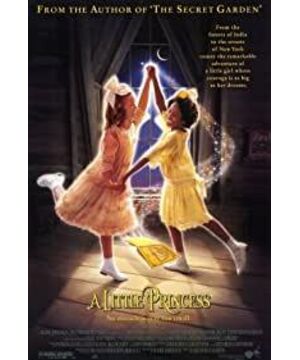"Little Princess"
I would like to see "The Little Princess" as an animated film full of innocence.
Sara is a Disney princess on the run.
"The Little Princess" was accidentally seen by me. When I read the comments, some people said they were moved and cried. I think how well the story is shot, it can make people cry, and after reading it, no tears fall out, but I am quite impressed by a few scenes and dialogues.
At the beginning of the story, the camera cuts back to Sara through the story of the princess and the prince. Sara asked the storyteller, "Have you seen the princess?"
The storyteller replied, "You are a princess, and every girl is a princess."
Sara lives a superior life and has a simple mind. She lives in the best single room in the school, gets along with her classmates, and befriends Becky, a low-status black servant in the school.
The biggest difference between Sara and the children around her is her independent thinking, rich imagination, and knowledge of the world without being sophisticated.
During the reading meeting, because she knew that the content was boring and not new, everyone fell asleep. After Rovinia finished reading, Mrs. Michaels asked Sara to continue reading. Sara did not read according to the book. She was not satisfied with the ending of the story, so she imagined herself At the end, everyone's eyes were gradually attracted and they gathered around.
"School doesn't allow imagination, it's only for those who lack everything, do you understand?" Mrs. Michaels said to Sara sternly.
The story of the princess and the prince told by Sara is closely linked to the line where her father participated in the war. When she told that the prince was unconscious on the ground because of the arrow poison, the father also fell to the ground because of the poison gas in the war.
Lawyers for Sara's father told Mrs Michaels that Sara's father was dead and no one would pay school fees again.
Mrs Michaels was so angry that she deprived Sara of all the material rights she enjoyed at the school and drove her into a run-down attic.
Mrs Michaels said: "You're not a princess anymore."
Sara drew a circle for herself and protected herself. Just like the protective circle the prince drew for the princess, as long as you stay in the circle, everything is safe. The pointed attic window reflected Sara's small body.
The princess was locked up in a pointed attic, surrounded by thorns, and she was helpless.
Becky asked, "Sara, can you tell a story?"
Sara said: "I won't tell stories anymore, there's no point in imagining"
Sara began to adapt to the environment. She served breakfast for her former classmates, cleaned the house, added firewood, served desserts, and bought vegetables...
During this period of life, Sara accepted, the former good friend gathered with her again, Sara gradually returned to her original state, she began to tell stories, and the former friend ran to the dilapidated attic as before to listen Sara tells stories, and children's laughter fills every part of the attic. The child's laughter is presented in two ways in the film, one is when Sara is the glamorous princess, and the laughter comes from the exquisite house; one is when Sara is the down-and-out princess, the laughter comes from the dilapidated attic. out.
"The Little Princess" tells the story of the early twentieth century, when world wars were frequent, and women were still living in the shackles of secular rules, as we can see from the knowledge taught in schools. The things that the upper class they need to learn include not being able to talk to the servants casually, because they are the masters, they will surrender their status; they can't make a sound when they eat; they can participate in reading clubs...
I think the most shocking part of the whole movie is Sara's revolt against Mrs. Michaels in the attic.
Mrs Michaels said: "You should understand that real life is not your fantasy story, it's a cruel and dirty world and it's our duty to do the best we can, not to indulge in silly fantasies, but to make ourselves useful People, do you understand?" Here is a shot of Mrs. Michaels looking up, and the whole environment is full of oppression.
"Yes ma'am," Sara replied, and Mrs. Michaels turned to leave when she heard the answer she wanted.
"But, I don't believe it."
"Don't tell me you're still a princess, God, look around you and look in the mirror"
"I'm a princess, all girls are, even if they live in small attics, even if they're shabby, even if they're not pretty, smart, or young, they're still princesses, we're all, your father didn't tell you Didn't he?" Sara's last words were almost shouted. At first, the overhead camera facing Sara gradually leveled off with Mrs. Michaels. At this time, the two sides were in an equal position, they were both girls.
The storyline of the whole film is not that bizarre, nor is it close to life. Mrs. Michaels is not a principled villain in the film. She and Sara are more like the contradictions of everyone in that era. Mrs. Michaels's concept of survival is more realistic and more in line with the survival concept of most people in that era. In the era of war, everyone yearned for Sara's optimistic lifestyle, but everyone lived as Mrs. Michaels.
After listening to Sara's words, Mrs. Michaels slammed out the door, stunned for a few seconds and then quietly touched the corner of her eyes, perhaps her father never told her "you are a princess".
It took me two days to write the look and feel of the film "The Little Princess". Yesterday, I thought it would be good to simply write it. When I actually wrote it, I realized that I only remembered a rough outline of the character's lines. The scene is blurry. So I went back and watched some clips again. When I write again today, I have completely let go of the concept of watching a movie for the first time. I said it was an animated movie for the first time. Now I think it is not a simple movie. A single live-action animated film, combined with its background, has many things that the film wants to express.
Combined with the camera, every time I look at it, I will have a different feeling. It is not necessarily because I am overinterpreting it. Maybe I am looking at it from a different angle. Some people say that this is to remind people to have an optimistic attitude in the face of difficulties, Mrs. Michaels The finale also reflects this sentence. But from that era, the ending of the film tends to be more idealized. Sara and Mrs. Michaels are two attitudes, and Mrs. Michaels is more realistic.
View more about A Little Princess reviews











